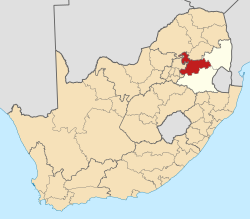This article needs additional citations for verification .(October 2009) |
Siyabuswa | |
|---|---|
| Coordinates: 25°7′S29°3′E / 25.117°S 29.050°E | |
| Country | South Africa |
| Province | Mpumalanga |
| District | Nkangala |
| Municipality | Dr JS Moroka |
| Area | |
• Total | 14.88 km2 (5.75 sq mi) |
| Population (2011) [1] | |
• Total | 36,882 |
| • Density | 2,500/km2 (6,400/sq mi) |
| Racial makeup (2011) | |
| • Black African | 99.5% |
| • Coloured | 0.1% |
| • Indian/Asian | 0.3% |
| • Other | 0.1% |
| First languages (2011) | |
| • S. Ndebele | 71.2% |
| • Northern Sotho | 11.3% |
| • Zulu | 6.7% |
| • Sotho | 2.9% |
| • Other | 7.9% |
| Time zone | UTC+2 (SAST) |
| Postal code (street) | 0472 |
| PO box | 0472 |
| Area code | 013 |
Siyabuswa is a township in South Africa in the province of Mpumalanga (a region formerly called Eastern Transvaal). During the Apartheid era, Siyabuswa was the capital of the KwaNdebele Bantustan. [2] It served as a capital from 1981 to 1986 when KwaMhlanga replaced it. Most of its inhabitants (population in 2011: 36,882) are members of the Ndebele ethnic group. Currently, Siyabuswa is home to several ethnic groups, namely the Ndebele, Pedi and Sotho people. [3]


